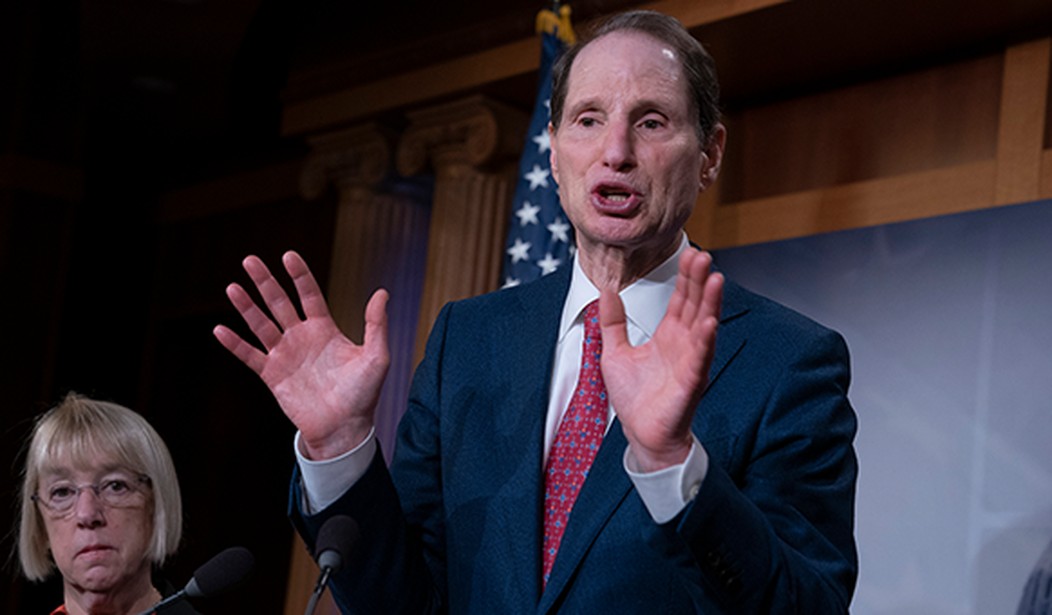Quelle surprise. Does anyone doubt that this was the precise intention of the IRS bureaucrat who committed a crime in leaking individual tax returns? Or ProPublica’s precise intention in cooperating with the crime by publishing the private data?
After a requisite amount of tongue-clucking over IRS security, Sen. Ron Wyden (D-OR) used the breach to argue for a new “wealth tax” to ensure the rich pay “their fair share”:
Wyden brought up the ProPublica report as he opened Tuesday’s hearing on the fiscal 2022 IRS budget request with Commissioner Charles Rettig. He said the data used in the report “appears to be a massive, unauthorized disclosure of taxpayer records” and called on the IRS to investigate the source of the disclosure. …
“What this data reveals is that the country’s wealthiest — who profited immensely during the pandemic — have not been paying their fair share,” Wyden said. “I’ll have a proposal to change that.”
Wyden did not describe his proposal during the hearing, but he appeared to confirm to reporters afterward that he was referring to his “mark-to-market” plan.
The Finance chair released a 32-page report in September 2019 describing his proposal to tax wealth like income, but he has not yet released legislative text. For individuals above certain income and asset thresholds, Wyden’s initial plan proposed taxing capital gains at ordinary income rates and requiring taxes to be paid annually on gains from tradable assets like stocks.
“I’ll have it ready to go here shortly,” Wyden said after the hearing. “And today, this article from ProPublica — I’ve had senators already ask me about it since then — highlights the need for the reform that I’ll be offering.”
This is nonsense, and Wyden knows it. The people whose data got exposed by ProPublica are paying the share that Congress laid out for them. One can debate whether it’s “fair” or not, but they’re not breaking the rules — they’re following the rules. Both Wyden and ProPublica are making them villains in order to provide some moral cover for invading their privacy and deflecting from the corrupt acts that led those returns to be exposed in defiance of privacy protections.
That point gets lost because Congress wants to deflect from the sorry truth about its management of the income tax system, in both individual and corporate contexts. If they wanted a truly “fair” system, Congress would pass a flat tax that treated all income the same for everyone. Simply take 20% off of everyone’s income, or some other specific percentage, and voila — everyone pays the same “share.”
Congress won’t do that, however, because that strips them of the ability to conduct social engineering through the tax code, as well as benefit their own supporters. Much has been made about the list of the supposed Villains Of Taxation Fairness on this list — Jeff Bezos, Elon Musk, Mark Zuckerberg, Bill Gates, Michael Bloomberg, Rupert Murdoch, and especially Warren Buffet. Buffet has been demanding for years that his fellow billionaires pay a “fair share” while apparently paying the lowest effective tax rate of them all. With the exception of Murdoch and maybe Musk, which party do these ultra-wealthy support — and how do people figure they got these tax-code benefits in the first place?
Wyden doesn’t want to fix the problem. He wants to fix the game in a way that pleases his own sense of social engineering, while leaving that path open for even more social engineering down the road.
Meanwhile, we still have a real scandal at the IRS that this nonsense is meant to obscure. The breach demonstrates that people in power feel an impunity to manipulate our private data to their own public purposes. The answer to this scandal, Charles C.W. Cooke writes, is to cut off access to that data in the first place:
One of the many advantages of living in Florida is that I am not obliged to furnish the state with any information at all in order to make my living. Florida does not know for whom I choose to work, or how much I make. It does not know to which charities I choose to donate, or how much I give. It does not know how large my mortgage is, or how much I still owe. It knows nothing, and it keeps nothing.
In 2016, a hack of IRS systems yielded the sensitive personal information of more than 700,000 Americans. Had those responsible, or anyone else, elected to try the same thing in Florida, they would have found zip.
It has long astonished me that left-leaning Americans are as bothered as they are by the PATRIOT Act — a concern I share, for the record — and yet are not only comfortable with the IRS as it exists, but, in many cases, would like to make it even more intrusive. Elizabeth Warren wants to institute an unconstitutional “wealth tax” that would require high earners to invite the IRS to superintend a whole host of their quotidian transactions. Joe Biden wants to spend $80 billion to double the IRS’s workforce and, thereby, to increase the number and scope of audits. The biggest achievement of the last Democratic administration fused the tax and health-care systems.
Realistically, which organization do we think is more likely to play a part in the release of information that embarrasses or damages you: the Internal Revenue Service, or your county library?
It might be a good time for rethinking the 16th Amendment. As well as the 17th.







Join the conversation as a VIP Member